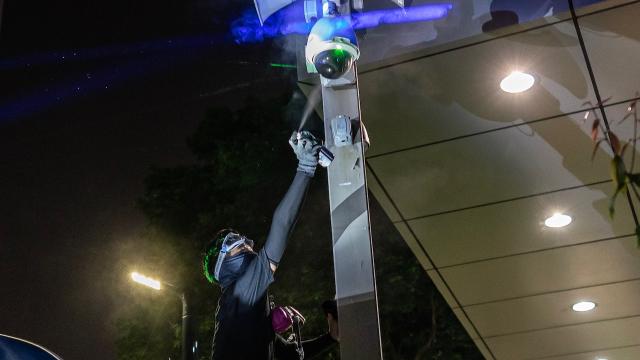The Hong Kong government has banned masks and face paint in its latest attempt to stop the pro-democracy protests that have been raging since June. The new “emergency” order was announced by Hong Kong leader Carrie Lam at a press conference Friday.
The new law bans “any facial covering that is likely to prevent identification,” during public demonstrations. Anyone arrested under the new rule will face up to a year in prison and a fine of roughly $5,000.
“We believe that the new law will create a new deterrence effect against masked violent protesters and rioters,” Lam said at a press conference that was carried live online. “Hong Kong is not in a state of emergency,” Lam assured citizens. “But we are indeed in a location of serious danger.”
Hong Kong protesters, upset about Beijing’s political incursion into the region, wear masks primarily for three reasons. First, protesters want to keep from being identified by cameras around the city that use facial recognition software. Second, the protesters don’t want to be identified by police forces on the ground, allowing authorities to target them later when they arrive home. And third, the masks can shield protesters from teargas, which has become a common weapon deployed by police.
Rumours were swirling this week about the anti-mask rule, dubbed the “prohibition on face covering regulation,” leading to even more protests on the streets as people shouted slogans and sang the region’s new protest anthem, “Glory to Hong Kong.” Protests have gotten even more heated in recent days following an incident on October 1 where a Hong Kong police officer shot a teen protester in the chest.
Protesters regularly destroy security cameras in an effort to stop Chinese authorities from recognising them, but in a world awash with cameras everywhere, the only way to truly be safe is by using masks. Lam said at today’s press conference that bans on face coverings were “something which has already been introduced in a number of jurisdictions around the world” and defended the move as something that could help to restore peace and order in the region.
Hong Kong has had relative autonomy from China’s central government since it was handed over by the British in 1997 and operates under a “one country, two systems” rule. The new law was passed by members of Hong Kong’s Executive Council, some of whom are accused of being too closely aligned with the Chinese government in Beijing. Lam herself is often denounced as a “puppet” of Beijing, who has reportedly wanted to quit her job, but isn’t allowed to by her overseers in China.
Lam pointed out that the new law includes exemptions for some people who need to cover their faces for their jobs. And while that might sound great, it would presumably mean that police are allowed to wear masks, while the average person would not.
Some protesters in Hong Kong have asked for the U.S. government to intervene in the region, but that seems highly unlikely. News broke late last night that Trump assured Chinese leader Xi Jinping that he wouldn’t even speak out in support of the protesters if he gave the U.S. concessions in a trade deal. That call took place on June 18, according to CNN, and Trump reportedly asked for dirt on his political opponents, Joe Biden and Elizabeth Warren, something that is illegal under U.S. law.
It’s not clear if the new anti-mask law would apply to journalists as well, since reporters have been caught in the crossfire between police and protesters over the past few months. Most recently, one reporter from the media outlet Suara Hong Kong News, Veby Mega Indah, permanently lost sight in her right eye after police shot her in the face with a rubber bullet on September 30.
The South China Morning Post, Hong Kong’s largest English-language newspaper, spoke with experts who believe there are plenty of loopholes in the new anti-mask law, though it’s way too early to say whether they’ll be successfully exploited.
“What if the guy says he wears a mask because has a cold and shows us a doctor’s certificate? We’ll have to give him reasonable doubt, and it will take a lot of time and energy to find out if he is really ill or not,” one police inspector told the SCMP.
So perhaps that’s the solution. Everyone have their doctor’s notes handy?
